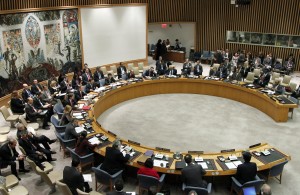Under the United Nations Charter, the UN Security Council bears the responsibility for the maintenance of international peace and security. The Security Council can take decisions in this regard that are binding on all UN Member States. The Charter empowers the Security Council to decide on a broad range of measures, including sanctions and the use of force, that may be necessary to maintain or restore international peace and security. The Council may take such decisions where it determines “the existence of any threat to the peace, breach of the peace, or act of aggression” in accordance with Article 39. The Security Council thus has a key role to play in responding to acts of aggression. The Rome Statute, as amended in 2010, takes account of this key role and preserves the primary role of the Security Council in determining an act of aggression.

Security Council debates its relationship with the ICC October 2012 © UN/ Rick Bajornas
Put simply, the amendments on the crime of aggression accord to the ICC the same degree of judicial independence from the Security Council as already existed regarding the other three core crimes.
In more detail:
The Security Council and the ICC may interact in several ways once the Court’s jurisdiction over the crime of aggression is activated (after 1 January 2017):
The Security Council may refer a situation to the ICC, which empowers the ICC to investigate all four crimes under the Rome Statute, including crimes of aggression, without any further conditions (Article 15 ter Rome Statute; Article 13 (b) Rome Statute). The Security Council’s powers under the UN Charter are the legal basis upon which the ICC can investigate such crimes without any consent requirement by the States involved.
Where an investigation is initiated by the Prosecutor proprio motu, or where a situation is referred by a State Party, the Prosecutor must inform the Security Council about the investigation and give the Security Council six months time to determine that an act of aggression has occurred. Where the Security Council makes such a determination, the Prosecutor may then proceed with the investigation regarding a crime of aggression in the same manner as regarding the other three core crimes. If the Security Council makes no such determination within six months, the Prosecutor may only proceed if so authorized by the judges of the Court’s Pre-Trial Division. In other words, there is no requirement for the Security Council to actively determine the existence of an act of aggression or to authorize ICC investigations for the Court to proceed. This solution was possible because Article 15 bis created a consent-based regime and thereby reduced the scope of the Court’s jurisdiction.
The Security Council may also suspend an investigation into a crime of aggression under Article 16 of the Rome Statute for a period of one year. This provision applies equally to all four core crimes under the Rome Statute.
The Security Council’s determination of an act of aggression in accordance with Article 39 is not binding for the ICC. This follows from the due process principles of the Rome Statute and was explicitly confirmed in Articles 15 bis and 15 ter. The Court thus fully retains its judicial independence vis-à-vis the Security Council, as the Court has to make its own assessment as to whether aggression has occurred.
